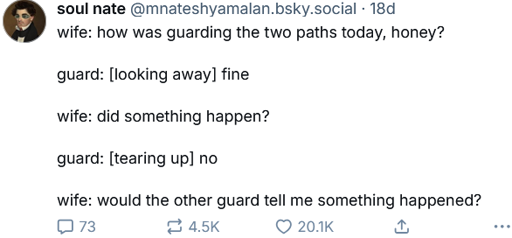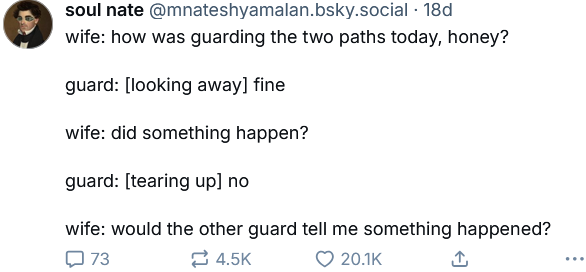The Guard's Wife
-
Wouldn’t he still answer no?
And then she'd know that something happened. Because if he's the liar, that means the other one would truthfully say "yes, something happened". And if he's the one who tells the truth, that means he just said "the liar would tell you 'no'".
It's the same riddle.
-
Wouldn’t he still answer no?
I guess she don't know if she got the one that lies or the one that tells the truth.
-
This post did not contain any content.
Now I want to see the guard with two wives.
-
This post did not contain any content.
The tragedy being that despite being married to him, she still doesn't know which one he is.
-
This post did not contain any content.
I thought it was an arrow to the knee joke...
-
that would require reading which, obviously my brain decided wasn't required in this thread.

It happens to the best oh us
-
This post did not contain any content.
I don't get it
-
I don't get it
-
The tragedy being that despite being married to him, she still doesn't know which one he is.
Maybe they get assigned roles each day at random to increase security?
-
This post did not contain any content.
Haven't laughed like this in quite some time
-
Wouldn’t he still answer no?
Correct. If he's the lying guard and something happened, or the truthful guard and nothing did, then in either case he would answer "no" to all the questions.
It's interesting, because it makes me think about the solution to the original puzzle. In that one, you don't care about the individuals' identities, you just care about the answer, so you actually don't know which one lies and which one tells the truth at the end. If the goal was to find out which one is which, you would need one more question: "and which one do you think I should take?" If he gives the same answer, he's the liar; if he gives the opposite answer, he's the truthful one. (Or just ask a question with a known answer first.)
-
This post did not contain any content.
The confusion in the comments is why you shouldn't take life advice from the Internet.
-
Correct. If he's the lying guard and something happened, or the truthful guard and nothing did, then in either case he would answer "no" to all the questions.
It's interesting, because it makes me think about the solution to the original puzzle. In that one, you don't care about the individuals' identities, you just care about the answer, so you actually don't know which one lies and which one tells the truth at the end. If the goal was to find out which one is which, you would need one more question: "and which one do you think I should take?" If he gives the same answer, he's the liar; if he gives the opposite answer, he's the truthful one. (Or just ask a question with a known answer first.)
Ask either which way the other guard will tell you to take. They'll both tell you the wrong path.
-
Correct. If he's the lying guard and something happened, or the truthful guard and nothing did, then in either case he would answer "no" to all the questions.
It's interesting, because it makes me think about the solution to the original puzzle. In that one, you don't care about the individuals' identities, you just care about the answer, so you actually don't know which one lies and which one tells the truth at the end. If the goal was to find out which one is which, you would need one more question: "and which one do you think I should take?" If he gives the same answer, he's the liar; if he gives the opposite answer, he's the truthful one. (Or just ask a question with a known answer first.)
If the goal was to find out which one is which, you would need one more question
"Would the other guard identify you as the liar if asked?"
The liar will deny it while the other guard will anticipate the liar's answer and say yes.
-
This post did not contain any content.

